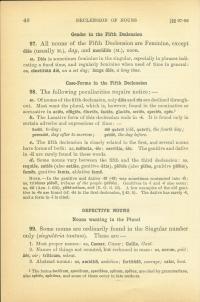98. The following peculiarities require notice:
a. Of nouns of the 5th declension, only diēs and rēs are declined throughout. Most lack the plural, which is, however, found in the nominative or accusative in aciēs, effigiēs, ēluviēs, faciēs, glaciēs, seriēs, speciēs, spēs.1
b. The Locative form of this declension ends in -ē. It is found only in certain adverbs and expressions of time.
| hodiē today | diē quārtō (old, quārtī) the 4th day |
| perendiē day after tomorrow | prīdiē the day before |
c.The 5th declension is closely related to the 1st, and several nouns have forms of both.
māteria, -iēs
saevitia, -iēs
The genitive and dative in -ēī are rarely found in these words.
d. Some nouns vary between the 5th and the 3rd declension.
equiēs
satiēs (also satiās, gen. -ātis)
plēbēs (also plēbs, gen. plēbis)
famēs (gen. famis, abl. famē)
Note— In the genitive and dative -ēī (-ĕī) was sometimes contracted into -ei.
tribūnus plēbei tribune of the people (plēbēs)
Genitives in -ī and -ē also occur.
diī (Aen. 1.636)
plēbī-scītum
aciē (B. G. 2.23)
A few examples of the old genitive in -ēs are found (cf. -ās in the first declension, § 43.b). The dative has rarely -ē, and a form in -ī is cited.

